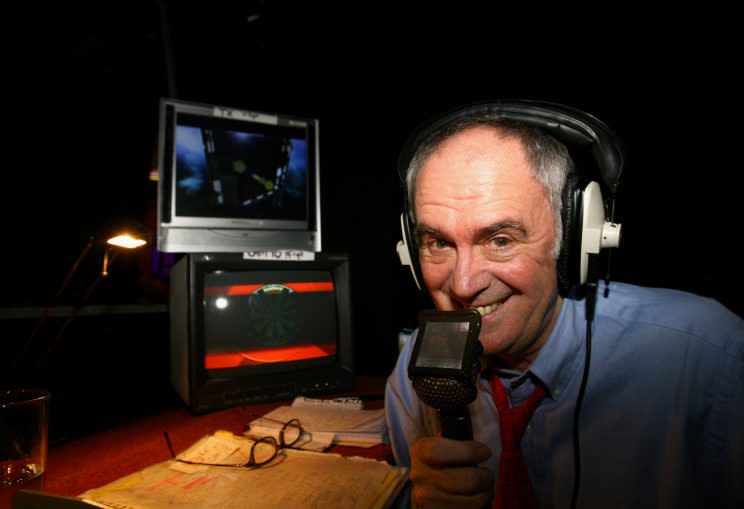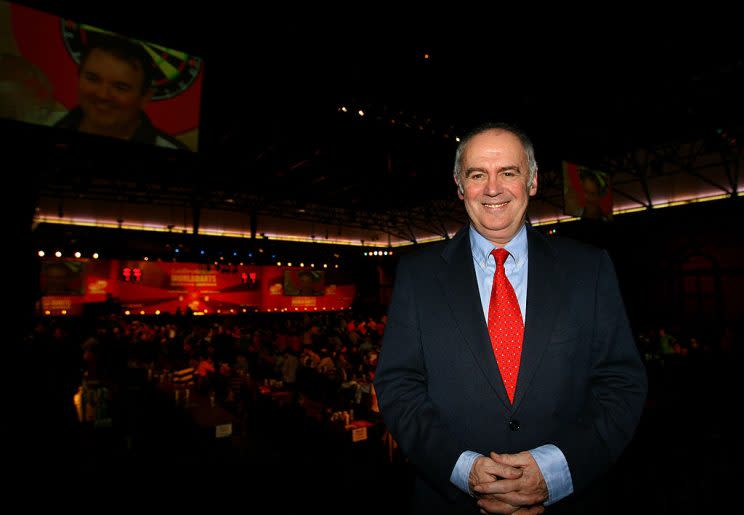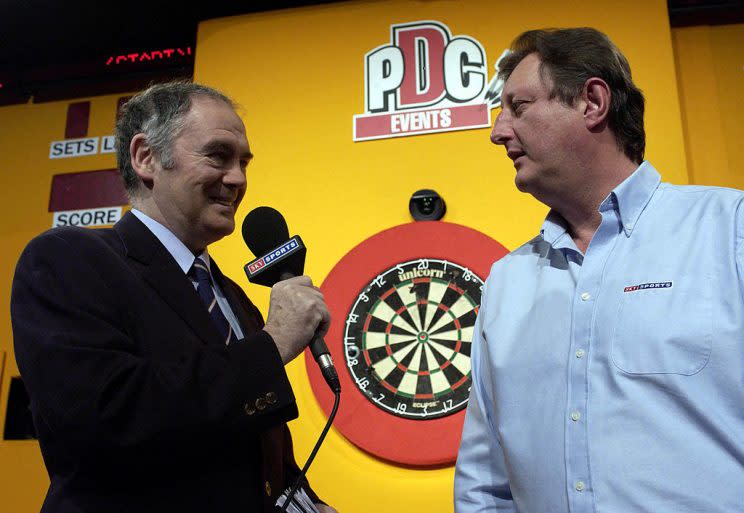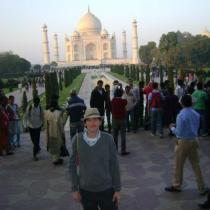Voices of Sport: Sid Waddell - The memorable maverick of the darts commentary box who helped sell the sport to the masses
In our weekly series, Yahoo Sport’s Nick Metcalfe features a famous voice of sport. With the PDC World Championship at Alexandra Palace under way, darts commentator Sid Waddell is the latest to go under the spotlight.

We’ve featured some genuine one-off characters in this series, but perhaps nobody quite in the same league as Sid Waddell. He could very well be the king of the one-offs.
Waddell is totally deserving of being referred to as the “Voice of Darts”. And what an unforgettable voice it was for many decades.
Passionate, charismatic, eccentric. Waddell was, frankly, very often a joy to listen to. I’ve no doubt you can hear that voice in your heads now. And I’m equally sure the memory of it will make you smile.
It’s no surprise that Waddell, the son of a miner from Northumberland, loved darts all his days. Growing up in the north east, he used to head to the local pub after a day at school to play the game.
Waddell was actually a very decent rugby player in his younger days, but after picking up an injury during his time at Cambridge University he turned his attention to spend more time enjoying darts. Quite simply, he fell in love with the sport.
For some years Waddell worked at Durham University. He could have opted for an academic life, but television soon came calling. He worked as a researcher for Granada, before becoming a producer for Tyne Tees, and then Yorkshire. He produced more than 600 editions of Yorkshire’s local TV news programme, Calendar, as well as devising the ITV children’s series The Flaxton Boys.
In 1972, Waddell created a programme still fondly remembered by older generations, The Indoor League. Presented by former England cricketer Fred Trueman, the programme featured games like darts, pool, table football and bar billiards. We saw some of the stars of a grander future for darts, like John Lowe.
At around the same time, the prestigious News of the World Championship was covered by ITV for the first time. Viewers became used to seeing highlights on World of Sport, the much-loved Saturday afternoon programme that I wrote about at length when I featured Dickie Davies in this series in October.
The sport clearly had a future on television, but Waddell had to wait until switching to the BBC before he found his true vocation. He joined the corporation in 1976. And the BBC soon offered Waddell a role as commentator. It was the start of a famous era.
He first worked on the sport in late 1977, before covering the first World Championship in February 1978. The annual event, first held in Nottingham and Stoke, and since 1985 at the Lakeside Club in Surrey, has been a mainstay of television at the start of the year ever since.
There were some memorable characters in the sport in those days, and viewers simply loved them. Bobby George, Eric Bristow, Jocky Wilson. We all had our favourites, and like snooker in its heyday there was an element of soap opera about it all.
Waddell was making a name for himself too. He just sold darts so brilliantly, with his obvious love and appreciation of the sport, and uncanny ability to produce a line that stuck in the memory.
That’s what we remember most about Waddell, those extraordinary phrases of his. A player wasn’t just hot under the lights, he was “sweating like a donkey in a Savannah swamp”. Somebody wasn’t merely getting excited, but “going up and down like a hedgehog in a hammock” or maybe “twitching like a ferret in a wind tunnel”. It didn’t matter how surreal it sometimes sounded, darts and Waddell just worked well together. They were the perfect match.
“Bristow strikes back – just like the Empire,” he shouted during an early commentary. Coming from most other people, these lines probably wouldn’t have worked. But that’s the way of the genuine maverick.

Waddell’s intelligence shone through too, with his many literary and historical references. I actually think that, due to the obvious comedy associated with his commentaries, along with that element of pantomime that darts has always embraced, intelligence was one of his underrated qualities.
When Bristow claimed his fourth world title in 1985, Waddell stunned viewers with this line: “When Alexander of Macedonia was 33, he cried salt tears because there were no more worlds to conquer… Bristow’s only 27.” When Englishman Cliff Lazarenko was trailing in one match, he exclaimed: “If Cliff gets back in this, it will be the greatest comeback since Lazarus.”
With television tending to be dominated by well spoken voices from southern England, particularly in the 1970s and 1980s, Waddell stuck out like a sore thumb. A north east accent on the BBC, in prime time. All the usual rules were being ignored. Waddell didn’t really do any rules though. That was a key part of his charm.
The World Championship kept producing great stories – a thrilling final between Bristow and George, the rank outsider Keith Deller shocking Bristow to win the title in 1983, a nine darter from Paul Lim in 1990, and the emergence of the greatest of them all – Phil Taylor. But in many ways, whatever happened on the oche, Waddell was becoming just as famous as any of the stars.
It wasn’t just about darts for Waddell in the 1980s, he also wrote the popular football-based BBC children’s series Jossy’s Giants. The adventures of manager Jossy Blair and his team kept us entertained for two series in 1986 and 1987.
The darts world was thrown into turmoil in 1992 when the top 16 players, frustrated by declining TV coverage of the sport, broke away and formed the World Darts Council.
A new World Championship was created, and from 1994 there have been two separate tournaments. The new tour had a lot more TV exposure than before on Sky Sports, with the leading players beginning to enjoy far greater riches.
Waddell stayed with the BBC for a while, and actually worked on the older World Championship in 1994. His final BBC commentary was that year’s final at the Lakeside between George and John Part.
A switch to Sky became inevitable however, and Waddell joined the satellite company in 1994, his first event being the World Matchplay in Blackpool. More televised tournaments during the year meant a lot more of Waddell. The extra glitz and glamour now associated with the sport suited the naturally effervescent commentator.
The Sky years have seen a host of classic moments and matches. Waddell described his first nine darter, for Taylor at the World Matchplay in 2002. And we witnessed probably the finest match in the history of the sport, Raymond van Barneveld beating Taylor in a remarkable 13 set marathon world final in 2007.
Darts was growing bigger with every passing year, and by the time the PDC World Championship switched from Purfleet’s Circus Tavern to north London’s famous Alexandra Palace for the 2008 tournament, the sport was truly hitting the big time.
With its huge crowds and raucous atmosphere, the annual event has become a fixed part of the holiday season. It now totally overshadows the BDO World Championship, despite the older event still being available on free to air TV.

Naturally the wonderful Waddell phrases kept coming, and they were as idiosyncratic as ever. He once told viewers: “The atmosphere is so tense, if Elvis walked in with a portion of chips you could hear the vinegar sizzle on them.”
It was hard for some in the commentary box to keep finding superlatives for Taylor, as the Stoke man kept racking up the world titles, but Waddell – who worked with Taylor on his autobiography – kept finding unlikely compliments from somewhere: “If we’d had Phil Taylor at Hastings against the Normans, they’d have gone home.”
A night out at the darts was actually becoming fashionable, the place to be seen. Waddell was of course very much part of the show. He even shared the commentary box one night with comedian and actor Stephen Fry.
I spoke with Sky commentator Rod Studd, who worked alongside Waddell, to find out a little more about the man himself. “I never met anyone like him,” Studd told me. “He was more popular than most of the players.
“Sid was obsessive about darts. He was apparently haphazard with his organisation, writing things on scraps of paper and the backs of envelopes. But if you wanted to know something about any player, he would find the back of an envelope and quote you umpteen facts.
“He was incredibly intelligent as a Cambridge graduate. I don’t think people realise, he was a genius. He was unparalleled when it came to being a wordsmith, there was such variety in his prose. It was a fascinating paradox that he was involved with darts, which is such a working class sport.
“He was so friendly and generous with his time. He was confident in his own ability, but not arrogant. I remember going into the press room once and he was chuntering to himself. He told me ‘I’m just practising my ad-libs’. And every time you did a commentary with Sid, 30 seconds before he’d pat you on the back and say ‘Enjoy yourself, kid’.”
Studd also believes Waddell always thought darts could be much bigger than it was, long before the incredible explosion of interest in recent time.
“Sid used to say ‘welcome to the tungsten thunderdome at the Circus Tavern,” he added. “He called the players gladiators. He always saw the potential for the sport, that darts could be something for the masses. He was a visionary in that regard.”
Sadly, Waddell was diagnosed with bowel cancer in 2011. He did return to the commentary box for the Premier League in 2012. His last commentary was the final of that event between Taylor and Simon Whitlock.
Waddell died in August 2012, at the age of 72. Darts had lost one of its finest ever ambassadors, and television had lost one of its most distinctive voices.
Tributes from across the sport and far beyond poured in. Lowe summed it up perfectly when he said: “Darts has lost its champion of the commentary box.” Taylor said: “I feel he’s still here, because I can still hear his voice.”
Studd revealed that at Waddell’s funeral, another commentator Dave Lanning delivered the eulogy, and came up with a line that encapsulated his relationship with darts perfectly: “Sid Waddell took darts from spit and sawdust to champagne and stardust.”
It was announced that the winner of the world title would now be awarded the Sid Waddell Trophy. His legacy in the sport is secure.
There’s an obvious sadness that Waddell is no longer around to entertain us, particularly during the festive spectacular at Alexandra Palace. We do know for sure however that his voice will live on in thousands of video clips.
Pure Sid. One of the best friends darts ever had. And an unforgettable companion for millions of viewers.


